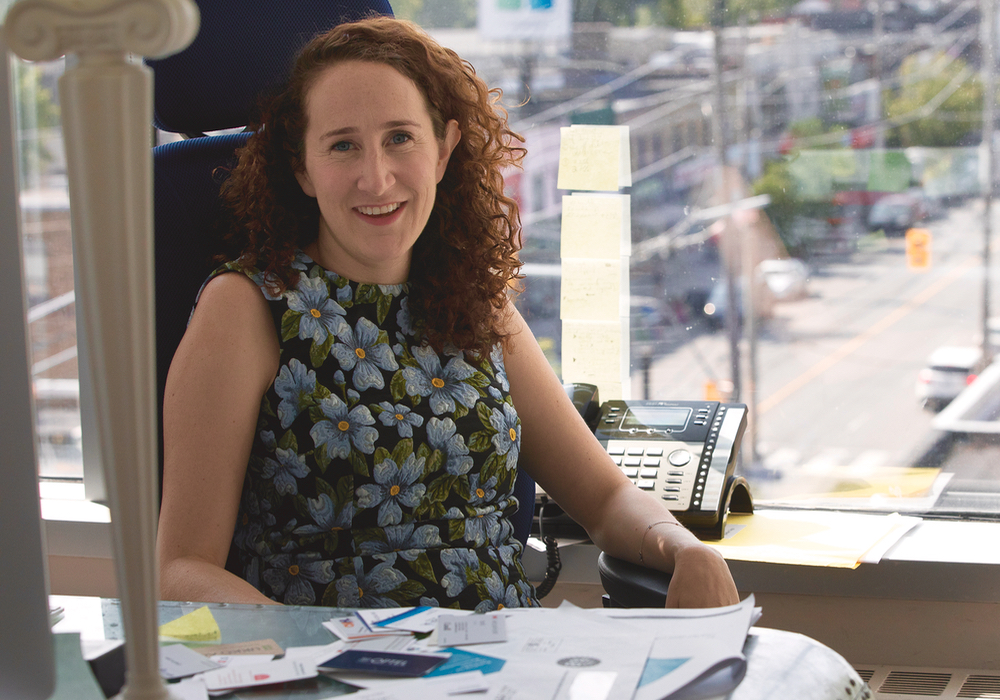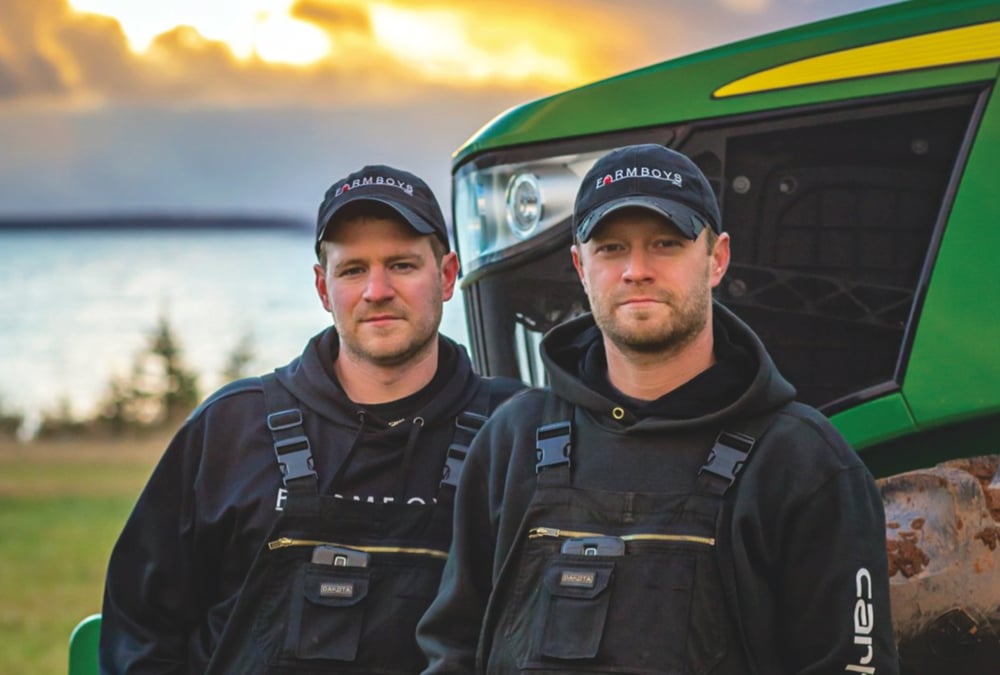It’s a common scenario: Farmer Bill has been renting land from his neighbour for years but the time has come and he is ready to sell. He wants Bill to have first refusal on the land, but Bill has just financed a new barn and bought a new combine, so he’s too over-extended to raise the money from his lending institution.
With the next generation waiting in the wings, how is Bill going to raise the capital to purchase the land he desperately needs for expansion?
Read Also

Riding the tariff rollercoaster
Farmers are accustomed to roller-coaster years. But the current geopolitical windstorm is something else entirely. On his cattle operation near…
This is the kind of scenario that prompts Bill and others like him to call Joelle Faulkner, CEO and founder of Area One Farms, based in Toronto, which has developed a unique, equity-based financing model that partners long-term investors with farm operators.
In 2012, Faulkner’s brother, Benji, who operates the family’s fourth-generation dairy and cattle businesses — London Dairy Farms, London Dairy Supply, ProRich Seeds and Sequin Farms — at London with their parents, decided that he wanted to purchase some farmland in Saskatchewan, seeing it as an investment opportunity.
The family, including Joelle, got together with a group of friends to purchase a section which they then rented out.
That experience got Faulkner thinking about how people invest in land, and also about what the investment funds look for. “I realized I didn’t really want to be a renter/farmer,” she says. “I wondered, are there other people like that, and if so, what do you need for them to be interested in investing in farmland?”
She also had another thought stuck in her mind.
Some years before, in 2006, the family had had an opportunity to purchase a neighbouring farm. They had just built two barns, though, and they didn’t want to take on any additional bank debt, so they had to pass up what they knew was a great farm expansion opportunity.
“At the time we just said no to it and we probably wouldn’t have been that interested to have somebody buy it and for us to rent,” says Faulkner. But it got her thinking: what kind of ownership opportunity might they have been interested in?
A different model
That same year, Faulkner started Area One Farms. Believing there is a different way to share value, she created an equity-based, investment partnership model with the goal of providing value both for the investors purchasing the actual land, and for the farmers working it.
“I ended up with this idea of a true partnership that injects capital into the farm to enable growth while maintaining the land base control with the farmer,” Faulkner says. “The farmer still owns the portion of land he or she can afford, and any profit and capital appreciation that is created by the partnership is shared equitably by the farmer and the investor.”
As an example, let’s say a farm family owns 1,000 acres and rents 5,000. The landlord comes to them and is ready to sell, but the farm has too much debt to finance the purchase of 5,000 acres, even though they want to continue to farm that land.

If a typical outside investor purchased the land and rented it to the family, the rent would probably increase and there might be less likelihood of negotiating lease agreements that provide long-term stability for the farmer.
In this case, for a fee (charged to the investor), Area One Farms puts investors into a pool which purchases the 5,000 acres, and now owns five-sixths of the total farm, with the farmer owning one-sixth. The family continues to farm the whole 6,000 acres under a 10-year agreement and gets all of the income and any value gain on the sixth that they own, and also gets an additional 15 per cent of the profit and capital appreciation on the other 5,000 acres in return for managing that land.
The idea, says Faulkner, is for the family to build equity in the land as they farm it and over time potentially buy the investor out. The family pays no rental fees, payments or interest over the 10 years, because it’s not a debt. Instead, it’s a partnership arrangement, which Area One Farms continues to manage and administer. (See sidebar next page for a farmer’s experience.)
The right investors
Faulkner says it’s an investment opportunity that sometimes takes a bit of explaining, i.e. buy and partner with a farmer who cares deeply about the farm and is there to make it successful 24/7.
“Farmland is new for our investors if they are not from the farm,” Faulkner says. “It’s also a complicated investment model that works for the farmer and can seem restrictive for the investor, but we attract investors who can see the value in having the partner, and we have become the largest partner for crop producers in Canada.”
The simplest model to explain to somebody is, they buy land and they rent it out, Faulkner says. “But the idea of partnering with a farmer is attractive because not only will they produce a crop, they will work to make the land better, they clear trees, they drain water, and they make the farm more valuable; they also buy the farmland better because the farmers buy it from neighbours without involving real estate agents,” she says.
It’s a minimum 10-year partnership; the investor can’t take their money out during that time. Nor can they choose to rent in a given year, because it’s always a partnership, but they make more money because of their partners.
Some of the return on investment for the investor has to go back into machinery and inputs, just like any other farm, so the investor shares in the risk as well.
“The great part is saying to somebody, there’s a new opportunity where you get to be partners with the person who cares the most about this farm,” Faulkner says. “We have made good partnerships and when you have a good partner, the partner and the farmer do better than if he or she would have rented. As we keep proving that out, we will attract more investment.”
Faulkner grew up on the family farm, so she understands farming although she chose a different career path — completing three degrees: in engineering and in business at Western University, and a law degree as a Rhodes Scholar at Oxford University in England. Prior to Area One Farms she worked in finance, medical services and private equity.
With such a different background, it’s interesting she has ended up back in agriculture, creating an agricultural investment model that is based on partnerships.
An investment model that puts the farmer first
Area One Farms guiding principle, says Faulkner, is that a farmer or farm operator should always do better working with the company than they could on their own. “It’s an investment model that puts the farmer first,” she says. “It can allow them to expand and remain financially stable without having to take on additional debt or pay rental fees. The investor may fund additional machinery and operating costs, so they can use all of their equity to buy into the operation.”
The company also says it wants farmers to be more profitable, because everyone involved benefits when they are, so it also helps farmers to make their land more productive and ecologically sustainable. “We continually pursue new production methods and management principles that strengthen the farm from the soil up,” Faulkner says. “We invest in research, and help to communicate across all of our farm operations, sharing the knowledge and best practices of our community of producers from across Canada.”
Since establishing Area One Farms, the business has arranged around 20 partnerships largely across Western Canada, and invested about $200 million.
It may not always be easy to find the right investors, but Faulkner also does a lot of due diligence when it comes to finding the right farmers who best fit their model. “We look for a local partner who knows what they want for their life and has shown an ability to farm well,” Faulkner says. “Then we look at historic performance, financial and business records, references, community reputation, all of those things. It usually takes six or more months to partner with somebody.”
Faulkner believes there is a need for this kind of joint venture investment model, and that traditional lenders are not well structured to provide equity, but that is what’s needed to keep up with the changing realities of farming and farm transition.
“I don’t think it’s the financial system’s fault, but land, machinery and everything is getting more expensive, and the rate at which farm acres are growing is increasing,” Faulkner says. “If you have a storefront business, you don’t necessarily have to double or triple your inventory to support a sales staff. But in farming, you do. What worked 20 years ago for size really doesn’t work today. At the same time, the way that inheritance on farms used to work, doesn’t anymore. Traditionally, the farm would often go to the oldest son so he had much more equity. But today, because farms are worth so much more, there comes the issue of what’s fair and equitable, and if a farm needs to accommodate multiple children (whether they are farming or not) it needs to grow usually. All of those things come into play and that’s a lot of moving parts.”
Three scenarios bring farmers knocking
Generally, Area One Farms comes into the picture because of one of three scenarios, Faulkner says. One is that the land a farmer is renting is coming up for sale. Two is when the farm is buying out a family member or ex-family member for some reason, and three is when the farm is transitioning and needs to expand to accommodate more children or other family members.
It means Faulkner sees farmers at every point of the age spectrum.
“In the case of buying out the landlord, usually that’s younger producers,” she says. “As you get to the middle-aged producers, they want to buy out a family member, and the older producers have multiple kids who want to farm. Occasionally, there are other reasons too that people contact us, such as infrastructure reasons, like cleaning up land or wanting to irrigate, which it’s not easy to get financing for, but which we really like because they create value.”
A better job of farming
Another benefit for farmers is that with this model, the better job they do of managing and farming the land, the more equity they will earn.
“It changes your mindset because the traditional thing is how much can I afford, where with this partnership it’s how much can I do a good job of farming?” says Alberta farmer and Area One Farms’ partner Kurt Cole (see sidebar). “It’s not the traditional way to end up with your farm, but ending up with your farm and building a succession plan for the next generation is the exit strategy for this and we are working together with our good partner to get it done.”
What’s important is matching up partners who have similar goals. For example, one of Faulkner’s early investors is a company that specializes in land reclamation, so finding undervalued land to improve and partnering with a top-notch farmer to manage it and increase its productivity and value is ideal for the investor and the farmer, who expands acres and has more opportunity to be profitable. “It’s interesting because these kinds of partnerships add to the Canadian land base, add taxes to the rural municipality and increase productivity for the farmer and, ultimately, the return on investment for everyone,” says Faulkner.
Is there a catch?
At the end of the 10-year agreement there is the option to renew for another 10 years if both parties want to, or there is a mechanism for the farmer to buy a portion or all of the farm. “There is a defined process and the farmer can decide what parts they want to buy and if they don’t buy it all, we have to sell just that remaining block. All of the pieces are built to suit the farmer with the view that it’s our business combined, but it’s their life,” Faulkner says.
Faulkner has attracted over 200 investors, including some pension plans that are intrigued by the model, and see the opportunity for a secure investment while helping Canadian farmers achieve their goals.
On the other side, the farmers’ biggest question is often “what’s the catch?” “It’s generally the best deal they’ve ever seen,” Faulkner says.
From the farm perspective, Kurt Cole agrees. “We are still in charge of our own destiny,” says Cole. “This is our farm, and Area One Farms is a great, non-traditional, financing partner.”
A farm view
Kurt Cole, sought out Area One Farms when his three daughters and their husbands all decided they wanted to come back to farm. The mixed grain and cattle farm near Brownfield, Alta., already has several families involved, and Cole knew he’d have to expand on his 2,500 acres in order for the next generation to be viable.
It’s not always that a traditional lender is unwilling to lend the money to purchase land; sometimes the farmer isn’t comfortable with taking on additional debt. This model makes sense in that situation because the farmer enters into a partnership where he or she can increase their equity rather than debt, and it’s not all based on cash flow because there are no payments to make.
“Area One Farms fits the bill for us because it provided a partner on the capital and input side of our venture and we share the profit,” says Cole. “We provide all of the machinery and manage and make the farming decisions. It’s worked well for succession planning because the boys were all able to come back and be part of the farm full time, and without it I don’t think that would have happened.”
The biggest benefit to their farm, says Cole, is that they significantly reduced risk. “When you work with a traditional lender everything is in your court. Every year we input a lot of capital into the crops, and if you have multiple families starting up in the operation at the same time, that’s a tremendous risk that you have taken on,” he says. “Working with Area One Farms has taken that risk factor down because they are a shared partner.”
This article originally appeared as ‘In it together,’ in the September 2019 issue of Country Guide.
















